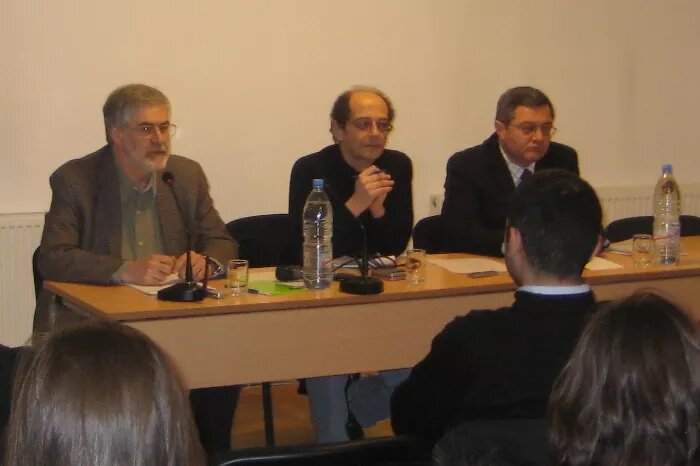
Speakers:
Gia Nodia – Political Scientist;
David Usupashvili – Chairman of Republican Party of Georgia
Moderation: Giorgi Gvakharia
The first speaker, a political scientist Mr. Gia Nodia, introduced to the public his point of view on the strategy existing in opposition. As per Gia Nodia’s opinion today in opposition three basic strategies can be observed – moderate i.e. parliamentary opposition; radical opposition who in the current situation, considers it impossible to have relationships with the government based on regular political procedures and therefore it develops revolutionary ideas; and neutral opposition the representatives of which share the points of view of the radical opposition, but whose demands are stated in a different way by means of demanding on the conducting a referendum before the resignation of the president.
Gia Nodia thinks that the reason of this opinion variance is that the neutral opposition representatives, the members of the “alliance for Georgia”, assess the reality in Georgia from the stage of the western political situation. They argue, that since the war of November and August of 2007 the western support of president Saakashvili and his government has lessened significantly and in certain groups the idea of finding a new leader, who will be more acceptable for the west, has emerged. The activation of Irakli Alasania’s team members on the political stage was determined by the desire of utilizing this opportunity.
Alasania’s team members are well aware of the attitude of the west towards today’s Georgian opposition. They know that such opposition will not be supported by the west which requires opposition to be more civilized and respectable. As a result Alasania’s team is trying to satisfy these demands. However, simultaneously they also have to take into consideration the Georgian reality, which requires more radicalism. The action rules needed for being recognized as respectable opposition in the west and the action rules needed for being recognized as respectable opposition in Georgia are inter-contradictory. It is very difficult to overcome this contradiction and this is the reason of the irrational steps which follow the action of neutral opposition.
At the end of his speech Gia Nodia spoke extensively about the referendum. He noted that the quasi respectability of this demand set a bad precedent. This demand also had no legal basis, as the ousting of president, irrespective of the form of this action, contradicts the constitutionalism logic.
According to Mr. Nodia’s opinion modern democracy is constitutional and representational constitution, which means that people as sovereigns are restricted by the constitution. If people elect president or parliament for five years, they will have to endure and allow them to rule during those years.
The “republican party” chairman Mr. David Usupashvili tried to explain to the public the reasons why their alliance had chosen to support a referendum. As per Mr. Usupashvili they are looking for the best way out from the reality and a referendum is a constitutional mechanism, which has solved a lot of significant issues in a lot of countries.
The “republican party” and the newly created alliance are asking a question: does the government have the ability to cope with the problems and challenges which face Georgia because of the incapacity and weakness of the government? As per David Usupashvili’s words if in this country significant changes do not take place, every next month and every next year there will be even more problems and a lot more will have to be changed; many of the problems might even be irreversible and unchangeable.
To the question given from the public about the reasons why the alliance had decided to support the legitimate way of assigning a referendum, which means the collection of the signatures of 200 thousand voters, David Usupashvili responded, that this was not the only legitimate way of assigning a referendum and that according to the Georgian legislation president could appoint a referendum without the signatures of 200 thousand voters. According to David Usupashvili’s explanation president’s referendum authority is one of the authorities which will have to go through significant alterations. However, today they chose to apply the president with the request of assigning a referendum because the current situation in the country did not give them the leeway of lengthy procedures which is why they considered it the shortest to request the president for assigning a referendum.
After David Usupashvili’s speech Gia Nodia noted that the constitution sets the presidential terms. Correspondingly the usage of a referendum for the same purpose would be anti constitutional and would mean the cancelation of the constitution by a referendum.
At Heinrich Boell the gathered public asked the following questions: What other reasons may exist for considering the referendum legitimate? What possible scenarios of the development of events are envisaged by opposition? How does the alliance see the cooperation with the radical opposition? Will the “alliance for Georgia” take part in the action of 9th April? What do you think about monarchy? How will the “new rights” and the “republicans” agree the models of monarchy and parliament? What does opposition think about the reforms started by the government?
At the end of the discussion David Usupashvili said that he hoped that their demand about assigning a referendum would be satisfied. He also mentioned that if the government refused to compromise their alliance would continue working and fighting for better future. About the 9th April action David Usupashvili explained that consultations were being held about this issue and that they would participate in the wide scale actions if possible dangers and provocations were excluded.
At the end of the discussion Gia Nodia concluded that he had become confident that David Usupashvili frankly did not like this government and that he would be willing greatly to assure the president in the significance of assigning a referendum. However, Mr. Nodia added that he had also become confident that the “alliance for Georgia” did not have a clear strategy for achieving this goal.
Download report in Georgian pdf (21 pages, 120 KB)